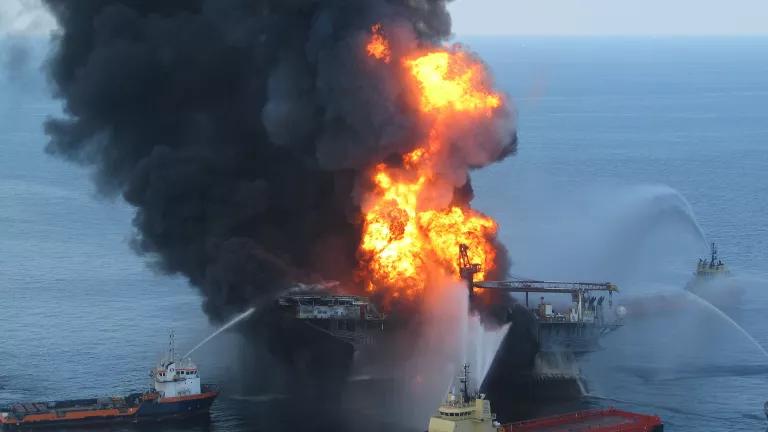NRDC presents on ocean planning & managing the melting Arctic at AAAS Annual Meeting next week
Next week, the scientific community’s AAAS Annual Meeting kicks off in San Diego. The nations’ leading science organization will be bringing together a diverse group of preeminent scientists, engineers, educators, and policy-makers from around the world to share ideas and insight on the most cutting edge science of the time.
NRDC will be sending a significant delegation to the meeting. And its oceans program will be hosting three panels: one on marine spatial planning (aka planning for the industrial uses & environmental needs of our seas); another on international management of new and emerging industrial activities made possible by the loss of sea ice in the Arctic; and a third on the impacts of sea ice loss on the Arctic environment.
NRDC OCEANS PANEL 1: Designing The Future Ocean: Baseline Data Needs for Marine Spatial Planning
Sunday, Feb. 21, 1:30-4:30 p.m., San Diego Convention Center, Room 17A
I’ll be hosting a panel with my colleagues NRDC Ocean Policy Analyst Leila Monroe and NRDC Science Center Director Gabriela Chavarria. We’ll be bringing together six marine spatial planning experts to explain the data sources behind several key ocean planning efforts and share the lessons they’ve learned from their hands-on work. This panel is particularly timely as the White House is in the process of creating a new national ocean policy. As a part of that process, the administration is weighing important decisions about how to move ahead on planning the uses of our ocean.
We ask a lot from our oceans – from food and energy to shipping and recreation. As demand on ocean space grows, we need a way to manage the increasing industrial pressure on our seas while protecting them from further harm and reviving ocean health. Marine spatial planning is the process of allocating spaces in the ocean for its various uses by identifying areas where industrial activities make sense and areas that should be safeguarded. Without such a process, we essentially see “ocean sprawl,” which stresses our ocean resources more than necessary and jeopardizes the food, jobs and recreation they provide. Identifying a smart planning process is especially critical now as America moves forward in developing clean, renewable energy off our coasts. Marine spatial planning can help develop new offshore renewable energy sources right the first time – minimizing conflicts between new and existing uses of the sea from the start so we can get clean energy up and running faster.
As we look to implement marine spatial planning, people are wondering: “What information do we need to plan responsibly? In this time of government belt-tightening, what can we do with limited resources?” This panel should provide recommendations for how we can manage our ocean resources so that they can support us and future generations.
NRDC OCEANS PANEL 2: Management and Governance in a Melting Marine Arctic: Challenges and Opportunities
Saturday, Feb. 20, 10:30 a.m.-12 p.m., San Diego Convention Center, Room 17A
NRDC’s International Oceans Director, Lisa Speer will be hosting this panel on international management of new and expanded industrial activities made possible by the retreat of the Arctic sea ice. Arctic warming has been front and center in the climate debate, but much less attention has been devoted to managing the accelerating human activity made possible by the sea ice retreat – from new oil drilling and fishing, to the opening of new shipping routes.
This panel will focus on international management and governance options that can best promote resilience for Arctic ecosystems in the face of ocean warming, loss of sea ice, acidification, and the additional impacts of new industrial activities. It will look at the existing international governance regime and offer a range of options for improving it.
NRDC OCEANS PANEL 3: Arctic Sea-Ice Loss: What This Means for the Conservation of Arctic Marine Ecosystems
Saturday, Feb. 20, 1:30-3 p.m., San Diego Convention Center, Room 17B
NRDC Arctic Science Fellow Tara Connelly together with Chuck Clusen, Director of NRDC's National Parks and Alaska Projects, will also host a panel on the Arctic - but with a focus on the impact of melting sea ice on polar and marine organisms. Present-day sea-ice loss is fundamentally altering the structure and function of Arctic Ocean ecosystems, from algae to top predators. And the new industrial activity will also have an impact.
Understanding the current science and recognizing the limitations in what we know is an important first step in addressing these impacts for future conservation efforts in the Arctic. This symposium will explore sea ice conditions in a melting Arctic, offer background on the links between sea-ice and Arctic ecosystems, examine how they may be responding to ice loss, and discuss the data and steps we need to develop a strong conservation plan.




